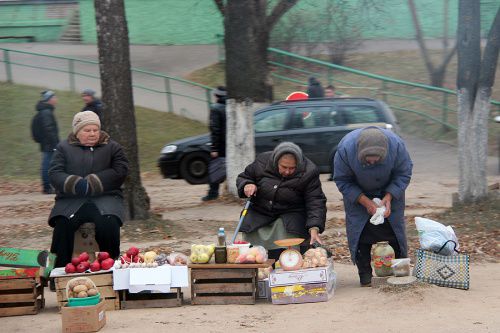In Belarus, western Ukraine's neighbor to the north, the Church is doing its best to reach out to the people, even as it faces such challenges as irreligion, poverty, and alcoholism in the former Soviet republic. “For 70 years efforts had been made to completely eradicate any belief in God,” Magda Kaczmarek, a senior staff member of Aid to the Church in Need, said after her visit to Belarus earlier in November. “The Church was not merely persecuted during Soviet times, but literally destroyed. Churches were made into cinemas, warehouses and sports halls. Priests were sent to Gulags in Siberia or murdered.” “However, there are still Catholics today who rely on the Church for support … among them are many who are searching and people who are open to God, but who were not able to or not allowed to live out their faith for any number of reasons. The Church is committed to finding them, reminding them of their Catholic roots and offering them pastoral care once again.” Kaczmarek noted that “examples of the Church’s support for society as a whole are the care for homeless people and families, as well as counselling services for pregnant women. Along with Russia, Belarus is among the countries with the highest abortion rates. This is a pressing problem.” She added that “in carrying out this work, the Church takes care of everyone, irrespective of religious affiliation. Anyone who needs help finds a ready welcome.” Among Belarusians, around 40 percent are irreligious, 48 percent are Eastern Orthodox, and 12 percent are Catholic. “One of the greatest challenges is providing pastoral care in matters concerning children, adolescents, marriage, and family,” said Kaczmarek, who noted that 70 percent of marriages in the nation end in divorce. “However, vocations can only grow within intact families that practice their faith.” The high divorce rate has led to a “great shortage of native priest and religious,” but “priests from other countries may only stay in the country for a few months,” she said. “The visas of foreign clergy are often not renewed … which leads to shortfalls in pastoral care.” “Another great need is building of small churches and chapels for new communities. One question that remains unanswered concerns the restoration of the Church property that was confiscated by the state after World War II. In many cases, the granting of parcels of land free-of-charge is a positive sign. However, it can take years to actually receive building permits. The bureaucracy is making it very hard on the clergy.” Kaczmarek noted that while the state does “welcome the Church’s social commitment, such as its soup kitchens, nurseries or pro-life activities … there is no state funding made available for any of these initiatives” and the Church is thus “largely dependent on outside help.” Recalling how she grew up in Poland during the Cold War, she noted, “I …. felt like I was back in this period of Poland’s history while I was in Belarus.” “You still feel the presence of communism. In the cities as well as in rural areas, monuments that honour Lenin or the soldiers of the Red Army, tanks and airplanes recall former times.” Alexander Lukashenko, Belarus' president, has been in office since 1994. According to Transparency International, Belarus has high levels of perceived public sector corruption, in Europe ahead of only Russia and Ukraine. “It is common knowledge that the Belarusians live under a dictatorship,” commented Kaczmarek. “The country seems very isolated … You feel that the people have little trust in each other. Uncertainty and mistrust are everywhere.” She also commented that “Belarus has the highest consumption of alcohol in all of Europe.” Despite all these challenges, Catholics and Orthodox are working together to serve Belarusians. “We have not forgotten that the Catholic Church helped us when times were difficult,” Metropolitan Paul Ponomaryov, the Russian Orthodox patriarchal exarch for Belarus, told Aid to the Church in Need Nov. 14. Both Churches suffered from anti-religious propaganda during the Soviet period, he said, adding that “Orthodox and Catholics have to defend the values of the Gospel. We have much in common.” “Today, a mind-set has taken hold that places the 'I' into the foreground and always stresses, ‘take what you can get.' Children are being raised with this fundamentally egotistical take on life,” he lamented. “Christians are called to live in the exact opposite way — to develop the willingness to make sacrifices for others and to give to those who have nothing or very little.”

